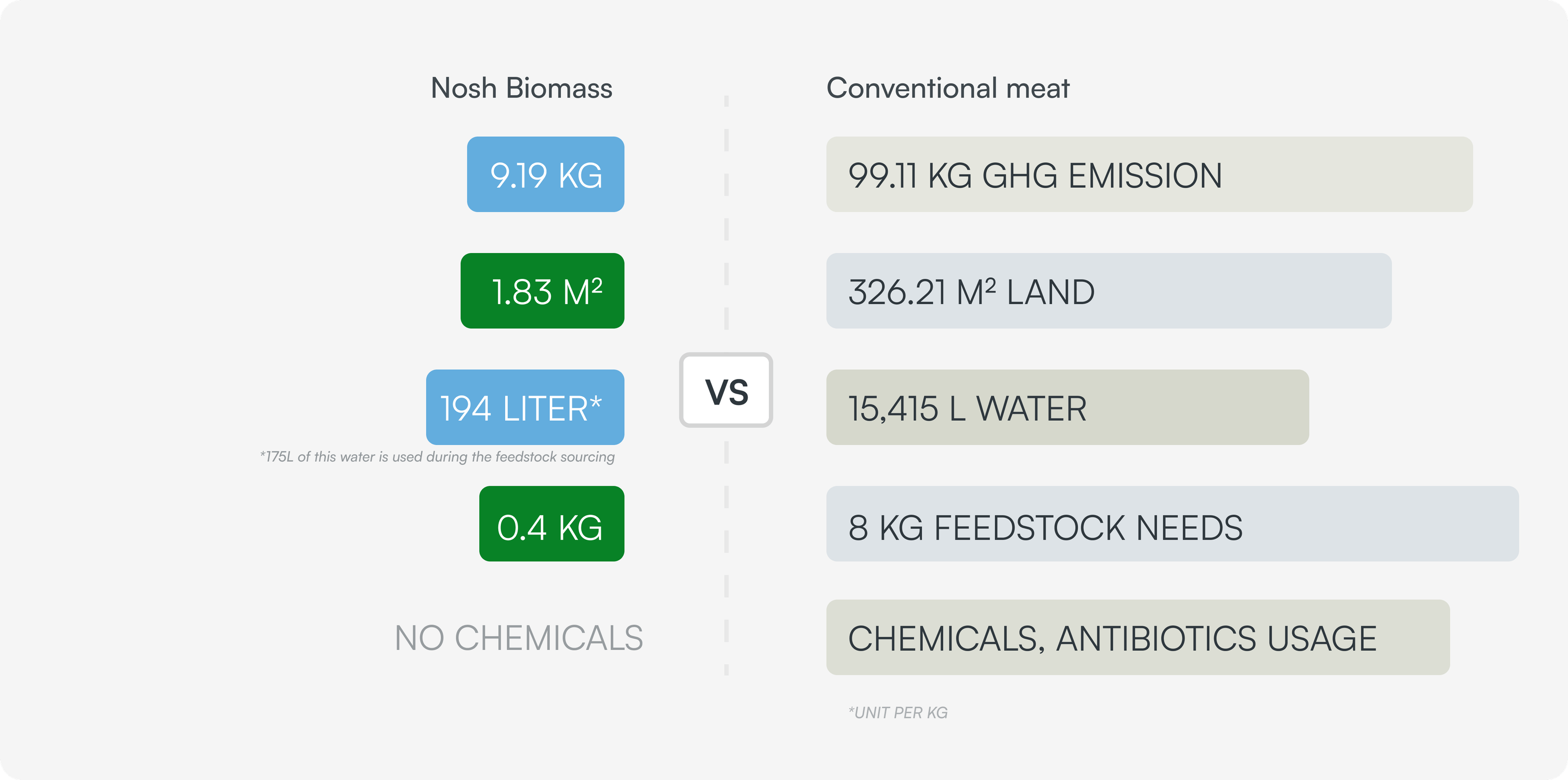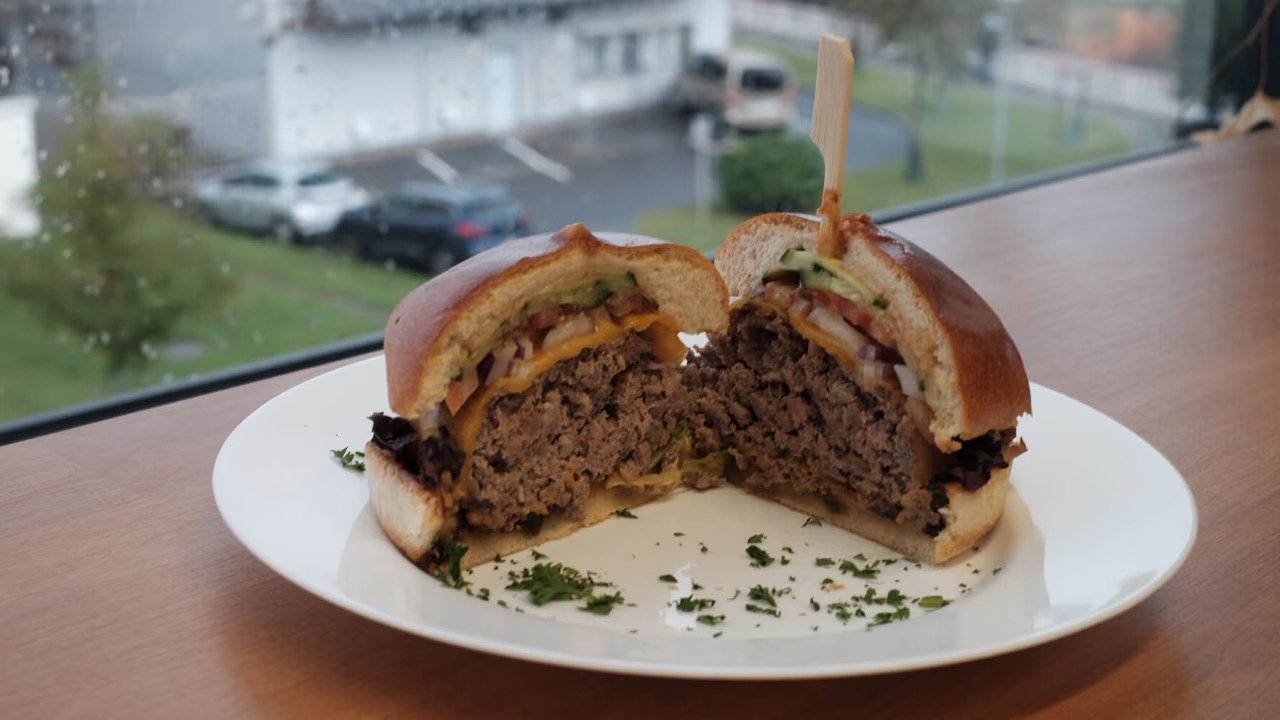Berlin-based startup Nosh.bio is debuting its Koji-based hybrid mince in partnership with Speisemanufaktur Adlershof, marking the product’s first public showcase.
This week, the hybrid mince is featured in the cafeteria's menu in a variety of familiar dishes — including burgers, meatballs, and lasagna, showing both its adaptability in different culinary formats and its suitability for large-scale food production, with meals available to the public.
There's no shortage of startups trying to reinvent meat – from Project Eaden to Umiami, Enough, and Mycorena to various cell-cultivated (lab-grown) meats. But it's an industry where startups often struggle to bring their products to market successfully.
From reBuy to rethinking meat: Why Tim Fronzek co-founded Nosh.bio
I visited Nosh.bio to try their ingredients firsthand and speak with co-founder and CEO Tim Fronzek. In the process, I not only sampled some impressive food but also came away with valuable insights — almost a playbook — on what it takes to succeed in the alt-protein space.
Fronzek brings over 15 years of management experience, having served in various C-Suite roles, notably co-founding reBuy.com, which achieved €200 million in net sales with a team of 600 employees.
He admits that while the work was rewarding, he decided to move on after realising he was more of an entrepreneur than a manager. During a year off to spend time with his family, he reflected on what to do next, asking himself, "Where can I have the biggest impact?"
After screening different industries by footprint and scalability, food emerged as the most urgent and impactful, inspired by a friend in the alternative protein space who highlighted the profound impact of food choices on the environment.
In collaboration with Brazilian microbiologist Felipe Lino, Fronzek co-founded Nosh.bio in early 2022.
The company aims to deliver a scalable ingredient solution that enables manufacturers to create affordable, nutritious and delicious food in an environmentally friendly way.
And here's how it's setting itself up for commercial success, with some great insights for others in the foodtech space:
Do extensive market research from the get-go
Before founding Nosh.bio, Fronzek and Lino spent nearly a year speaking with over 100 experts — scientists, corporates, startups, investors, and consumers. Most households won't pay a premium or sacrifice taste, so the challenge was clear: create affordable, mass-market-ready, sustainable alternatives.
Think commercially, not just social and environmental impact
While most alt-protein startups focus on plant substitutes as their end product, such as veggie nuggets or patties, Nosh.bio opted for a different approach, creating hybrid products that combine meat and alternative proteins to allow flexitarians and omnivores to reduce their meat consumption without eliminating it entirely.
While a vegetarian himself, Fronzek shared, "Flexitarians and omnivores are a much larger market than strict vegans, so blending allows us to maximise impact quickly."
According to Fronzek:
"Our goal isn't to eliminate meat but to reduce its quantity and improve quality. That's the change Nosh.bio is working to enable.
Nosh. bio's hybrid mince has been developed from the outset to match and surpass pure beef in key areas: cheaper than beef, it retains the flavour and mouthfeel with improved juiciness and delivers 30 per cent less cholesterol, increased dietary fibre, and high levels of protein. "
A Life Cycle Analysis (LCA) of Nosh. bio's protein found that it uses 99 per cent less land and water than beef protein and produces 90 per cent less CO2.
In Europe, nine major supermarket chains have pledged to achieve a 50:50 plant-animal protein ratio by 2030. With many consumers reluctant to adopt a 100% plant-based diet, blended formats like Nosh are gaining popularity and offer a realistic path to achieving these goals.

Strategic ingredient decisions leads to speed
Nosh.bio made a strategic decision to work with a microorganism that isn't classified as a novel food in Europe, allowing it to be used without going through the lengthy regulatory approval process that can otherwise take years.
Specifically, Nosh.bio uses the microorganism Koji, known in Japan for sake, miso, and soy sauce. It creates a high-protein ingredient for blended meat products.
The protein itself is derived from the fermentation of the mycelium of non-GMO Koji fungi, grown using only water and natural inputs. It's highly versatile with applications ranging from meat and seafood to confectionery, dairy and bakery products, meaning there are endless opportunities.
The fermentation process uses agricultural side-streams as feedstock. It can be carried out in existing fermentation facilities (such as a former brewery in Dresden) to enable rapid scaling while keeping downstream prices low. Its use meant the company could commercialise quickly without waiting years for regulatory approvals.
But, Fronzek admits, it also meant no patents on the strain itself, which put off some investors:
"Fortunately, in the end, we found the right backers who valued speed to market."
Disrupt the supply chain
While many in the alt-protein space focus on B2C products, such as patties that you can purchase at the supermarket, Nosh.bio took a different approach: B2B.
Nosh.bio partners with food manufacturers to overcome the taste, texture, and price challenges, especially in hybrid and plant-based applications. With a focus on industrial readiness and cost-effective scale-up, the team is helping accelerate the shift toward more sustainable, consumer-ready products.
According to Fronzek:
"We wanted focus. Building a consumer brand requires total attention and cash, and so does developing deep tech. Trying to do both risks failure.
By being B2B, we let established producers with existing production, retail networks, and brands use our ingredient. That way, we can concentrate on technology and impact while leveraging their reach."
Make change happen from within
Nosh.bio joins companies such as Enough, Mosa Meat, and the Vegetarian Butcher, who have all received investment from the meat industry. According to Fronzek, the company has received minor criticism for this, contending that while sustainability opens doors, "the real selling points are taste, texture, health benefits, and better margins."
"The reality is food startups can't disrupt without working with established players. They control distribution, regulation, and consumer trust.
If we want real impact, we must collaborate with them. The biggest meat producer in Europe is already both a customer and an investor. We're preparing retail launches in Germany with their support."
A dual approach to scale
Nosh.bio has developed a dual approach to scaling production. Its contract manufacturing partner can already produce up to 10 tons per week, with the capacity to scale further.
At the same time, Nosh.bio is retrofitting a decommissioned brewery in Germany for its own production. This strategy spreads risk, lowers capital expenditure, and provides greater flexibility. Further, both the CMO and the company's largest customer are also shareholders, ensuring aligned interests.
Create a great-tasting product
I like fermented food, hailing from the land of Vegemite — a sandwich spread created from beer sidestreams — so I was curious to see what Nosh-bio tastes like, when combined with beef mince.
Honestly, it's as you might expect, a nice umami addition, tasty and hearty enough that the reduced meat isn't missed, and interesting enough that people would want to eat it again.
Great science isn’t enough in alt-protein
In conclusion, I asked Fronzek what advice he would give to startups in the alt-protein space. He contends,
"Fundraising is unavoidable, and in food tech, investors want to see a clear path to commercialisation," he said. "Great science isn't enough.
Many promising startups fail because they can't bring products to market.
Our products were ready in terms of taste and texture two years ago, but scaling from the lab to industrial production and navigating slow B2B adoption cycles took far longer than I expected.
My advice: focus on building superior products, not just incremental improvements."
From here, Nosh.bio aims to expand into retail with co-branded products and scaling food service partnerships. Fronzek asserts:
"While chefs appreciate how easily our ingredient fits into their menus, reaching retail shelves is key to making a broader impact."



Would you like to write the first comment?
Login to post comments